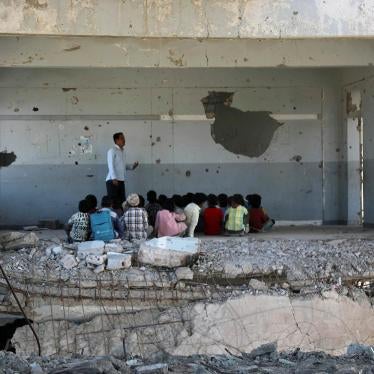By: Bonyan Jamal and Niku Jafarnia
After two years without the sounds of airstrikes, Yemenis in Houthi-controlled territories of Yemen have spent the last month waking up to the sounds of US and UK fighter jets conducting over 100 strikes on Houthi targets. And yet the US and UK’s silence on justice and accountability for Yemenis remains deafening.
Since 2002, the US military has been carrying out targeted attacks in Yemen that have caused significant civilian harm, and no one has been held to account for these actions. The US and UK have armed and supported a Middle East coalition led by Saudi Arabia and the United Arab Emirates, who carried out years of air strikes on the Houthis, who control part of the country, on behalf of a government in exile, and killed thousands of civilians in the process. Both the US and the UK could be complicit in possible war crimes committed by the Saudi and UAE-led coalition.
The United Nations has said that the resulting humanitarian crisis in Yemen is the worst in the world.
The US and UK have stated that their goal of the current strikes was to protect international shipping from the Houthis’ unlawful attacks on ships, in the name of protecting the Palestinians from Israeli attacks. But the Houthis have continued striking ships. President Biden himself has admitted the ineffectiveness of the strikes in Yemen. “Are they stopping the Houthis? No… Are they going to continue? Yes,” he said a few weeks ago in response to a reporter. The strikes have highlighted the US and UK’s continuous failed policy in the region: bombing has been prioritized over long-term support for justice.
If the US and UK want any chance at changing course on their failed strategy in the Middle East, they need to reverse their current approach and create a policy that prioritizes justice both in Yemen and in Israel/Palestine. The US and the UK should demonstrate a respect for accountability, international law, and human rights principles that does not only serve their short-sighted interests—both in Yemen and in Israel/Palestine—and choose to support civilian calls for justice.
Despite all of the evidence of US (and UK) complicity in violations of international law in Yemen that have been compiled by Yemeni civil society organizations, the UN Group of Eminent Experts and other UN bodies, and international nongovernmental organizations, the US failed to ensure accountability for its actions, and even obstructed investigations into their weapons sales to Saudi Arabia.
The warring parties in Yemen have committed widespread violations against civilians, with no repercussions. And yet the US and UK have failed to support Yemeni civil society’s broader calls for an international independent mechanism to investigate the violations committed throughout the conflict after their partners in the conflict–Saudi Arabia and the UAE–aggressively lobbied to end the mandate of the Group of Eminent Experts in Yemen at the United Nations Human Rights Council.
The US’s and UK’s continued impunity, and lack of support for accountability and justice in Yemen has also contributed to the lack of any mention of transitional justice in ongoing ceasefire negotiations between the Houthis and Saudi Arabia. Even with these limitations, the Yemenis who we spoke to felt the renewed strikes were jeopardizing the limited possibility of peace that they felt the ceasefire negotiations might bring.
“A few days ago, we heard news about a truce,” Aseel Ehab, a Yemeni cultural activist, told us. “It was like a dream. And now this news comes again, bringing back years that we hoped would never come back.”
While protecting international shipping is important, the US and UK’s choice to prioritize the protection of shipping while ignoring Yemeni accountability and justice processes, and while continuing to refuse to criticize Israeli violations, demonstrates a short-sighted and selective approach to their application of international law and human rights that will undermine stability in the region.
Despite their widespread abuses against civilians in Yemen, many Yemenis say they see the Houthis as the singular actor standing up for Palestinians, in contrast with the US and the UK, who continue to send arms and aid to Israel as it commits war crimes.
Continuing to prioritize strikes instead of policies that center accountability and justice will backfire on US interests in the region and provide actors like the Houthis the chance to whitewash their extensive human rights abuses. The US government has a choice: rather than repeating the same mistakes as previous administrations, they can start abiding by the international human rights principles they purport to uphold.
Bonyan Jamal is a lawyer and activist in Sana’a, and Niku Jafarnia is the Yemen researcher at Human Rights Watch.







